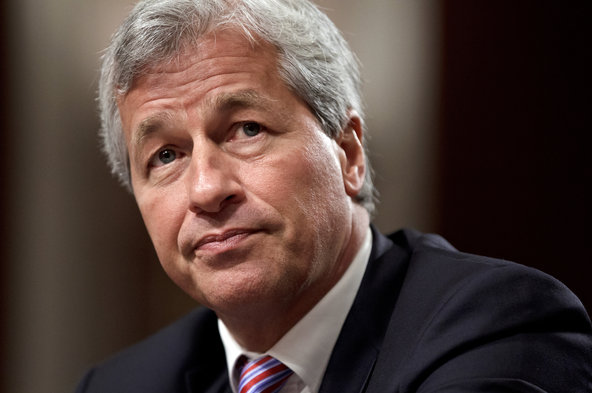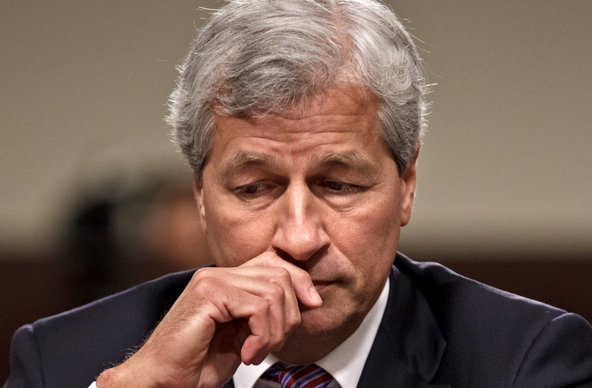 J. Scott Applewhite/Associated PressJamie Dimon, chairman and chief of JPMorgan Chase.
J. Scott Applewhite/Associated PressJamie Dimon, chairman and chief of JPMorgan Chase.
When it comes to shareholder votes, the running tallies are a closely guarded secret. Only a handful of parties get a peek into how these corporate battles are shaping up.
Now, in the midst of one of the most closely watched investor votes in years — over whether to separate the roles of chairman and chief executive at JPMorgan Chase — that protocol has changed. The firm that is providing tabulations of the JPMorgan vote stopped giving voting snapshots to the proposal’s sponsors last week. The change followed a request from Wall Street’s main lobby group, the firm says.
The pension fund shareholders that are promoting a split at the top of the bank are crying foul. Knowing the current tally is critical for both sides in shaping their campaigns, they say — cutting off access to them gives JPMorgan, which is getting frequent updates, an upper hand.
“They have changed the rules in the middle of the game and it has created an unfair advantage,” said Michael Garland, assistant comptroller who heads corporate governance for the New York City comptroller John Liu. “It’s like playing a game where only the home team gets to know the score.”
JPMorgan declined to comment.
The results of the shareholder vote will be announced on Tuesday at the bank’s annual meeting in Tampa, Fla. This week, the shares of a number of big investors were voted. It is not known, however, how the vote is trending.
A majority vote in favor of stripping Jamie Dimon of the chairman’s job, while not binding, would be a heavy blow to the influential chief executive. Last year, a similar proposal garnered the support of 40 percent of the shares.
Broadly speaking, the ability to get real-time voting information is crucial for both Wall Street firms and the shareholders sponsoring proposals. A losing side may decide to pour more resources into its campaign, making additional calls or send additional correspondence to shareholders.
“It’s a critical part of the process,” said Charles M. Elson, director of the John L. Weinberg Center for Corporate Governance at the University of Delaware. He noted that “if you feel you need to win by shutting off information, it calls into question the strength of your arguments.”
Lyell Dampeer, a senior executive at Broadridge, said his firm was required to give real-time results to companies, and for years Broadridge gave that same information to proposal sponsors. But late last week, he received a call from an employee of the Securities Industry and Financial Markets Association, Wall Street’s main lobby group, requesting that Broadridge cut off access to organizations that are sponsoring proposals, he said. Sifma represents JPMorgan and other big banks and brokerage firms.
Broadridge is a little-known firm that distributes materials on behalf of banks and brokers and provides voting tabulations. Mr. Dampeer said the brokerage firms were his clients so he was “contractually obligated” to comply with their request. “It was a short call,” he said.
“We don’t have a view on this but we are caught in the middle,” Mr. Dampeer added. He said neither securities laws nor client contracts said Broadridge had to give information to the sponsors of proposals. “We act at the behest of our clients,” he said. And publicly traded companies are entitled to updates on shareholder voting.
Sifma declined to answer questions. In a statement, the lobby group said one of its working groups had concerns about “the authority of a vendor to release confidential information” and that group asked Sifma to pursue the issue. Executives at some banks were concerned, according to people briefed on the matter, that shareholder groups were leaking early vote tabulations.
The decision by Broadridge sheds some light on the usually obscure world of shareholder voting. Mr. Dampeer did not know how many other shareholders had been cut off from access, but he said the new policy would apply to countless other votes around the country.
Broadridge informed the Securities and Exchange Commission on Monday of its decision because the agency regulates brokerage firms. A spokeswoman for the S.E.C. declined to comment.
“If they aren’t providing results to one side, they shouldn’t give it to the company,” said Brandon Rees, acting director of the A.F.L.-C.I.O. Office of Investment.
For shareholders sponsoring the proposals, the tallies are particularly important at companies’ annual meetings, one of the few times when a broad swath of investors have access to management and board members. William Patterson, the executive director of the CtW Investment Group, which represents union pension funds and owns six million shares in JPMorgan, said that when deprived of the initial tallies, shareholders were at the whim of management.
“If you go in blind,” Mr. Patterson said, “you can’t really make an informed case to management” at the annual meeting about voting results “and hold them accountable.”
In the case of the JPMorgan vote, the stakes for both sides are high.
If shareholders vote to sever the positions, it would be a major victory for the sponsors and big shareholder advisory firms like Institutional Shareholder Services and Glass, Lewis Company, which have urged investors to vote for the split. Some of the big groups sponsoring this proposal have likened this effort to a presidential campaign and they say a vote in the favor would set the tone for dozens of other similar votes around the country.
For JPMorgan, a yes vote would put pressure on JPMorgan’s board to split the two roles. Management would not be required to do anything with the results, but failure to take some course of action could lead to more unrest at the bank. Over the last year, JPMorgan has been struggling with the fallout from a multibillion-dollar trading loss.
Behind the scenes, JPMorgan has been working to persuade shareholders to support having Mr. Dimon keep both the chairman and chief executive titles. He has been chief executive since 2005 and chairman since 2006.
Article source: http://dealbook.nytimes.com/2013/05/15/jpmorgan-voters-are-denied-access-to-results/?partner=rss&emc=rss


